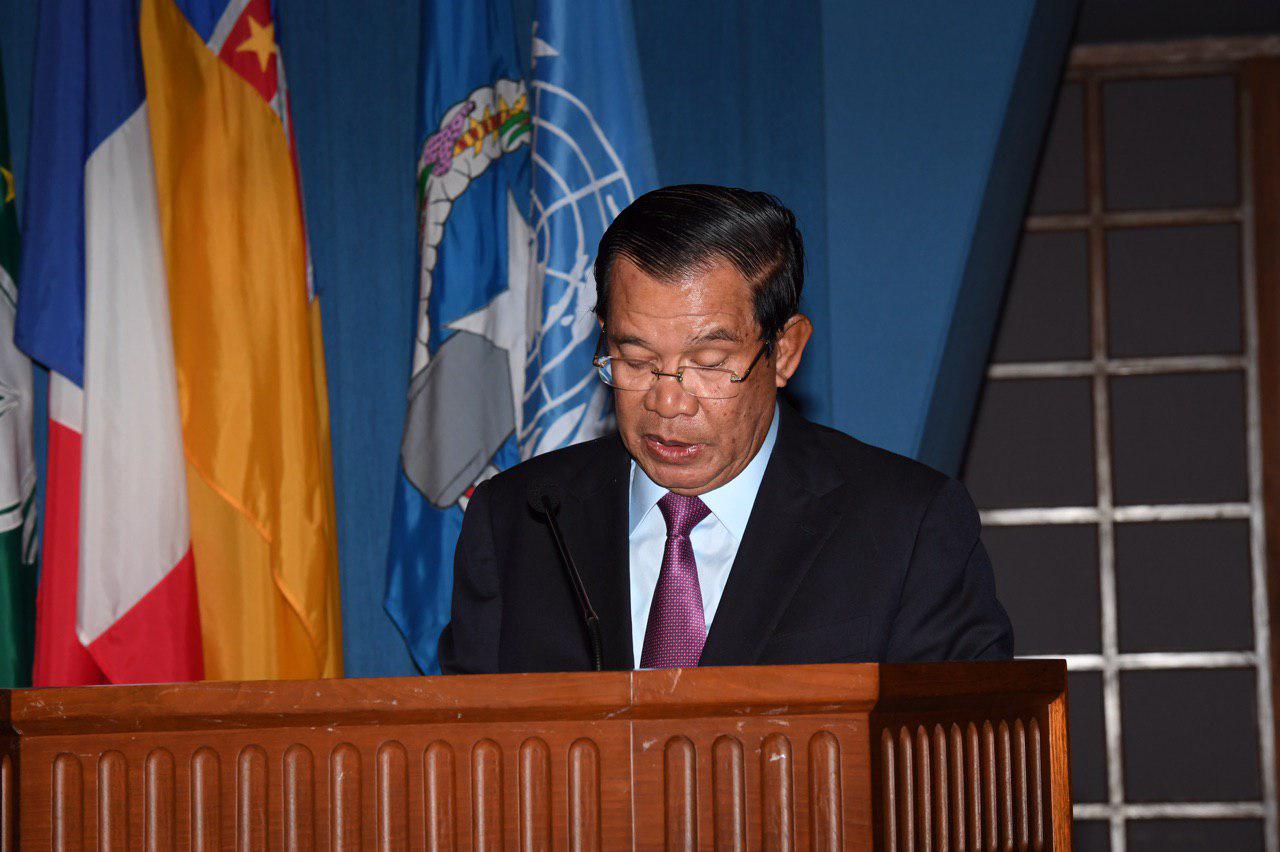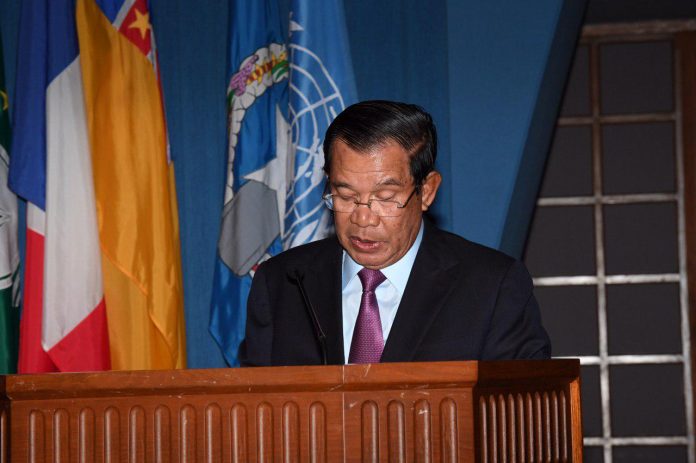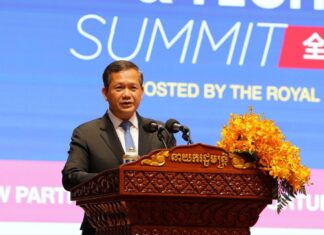– Excellency Damdin Tsogtbaatar, President of the Session;
– Excellency Baron Divavesi Waqa, President of the Republic of Nauru;
– Excellency Armida Salsiah Alisjahbana, Deputy Secretary General of the United Nations and Executive Secretary of the UN-ESCAP;
– Excellencies, Ladies and Gentlemen!
 Today I am very delighted to participate in the 75th Session of the United Nations Economic and Social Commission for Asia and the Pacific (UN-ESCAP) under the theme: Empowering People and Ensuring Inclusiveness and Equality. On behalf of the Royal Government of Cambodia, I would like to express my profound thanks and high appreciation to the UN-ESCAP for hosting and inviting me to this important event.
Today I am very delighted to participate in the 75th Session of the United Nations Economic and Social Commission for Asia and the Pacific (UN-ESCAP) under the theme: Empowering People and Ensuring Inclusiveness and Equality. On behalf of the Royal Government of Cambodia, I would like to express my profound thanks and high appreciation to the UN-ESCAP for hosting and inviting me to this important event.
The 2030 Agenda for Sustainable Development is a call for actions in responding to the goal: “Leaving No One Behind”. The theme of the High-Level Political Forum 2019 on Sustainable Development Goals (SDGs) and this year session’s theme reflect the goodwill of global community in guiding the societies with social divisions to encourage them to empower, ensure inclusiveness and provide equal opportunities for all. I firmly believe that UN-ESCAP under the bold and dynamic leadership of H.E. Armida Salsiah Alisjahbana, Deputy Secretary General of the United Nations, and Executive Secretary of the UN-ESCAP, will truly succeed on this goal.
Obviously, in general, the differences or divisions between social groups are common in every society. In particular, for the Cambodian people, despite the progress in the last few decades, there are still some people or communities that have not been properly empowered, are still vulnerable, and have not been paid enough attention. What should we do to ensure that our people could become the agents of change, determine their own destiny, and are appropriately empowered? How can we overcome the challenges to achieve social equality in accordance with our wish? I am convinced that one of the ways to achieve this goal is ensuring the inclusiveness. Inclusiveness can be achieved by empowering people, starting from the local level, which will enable them to express their needs for transforming to a more equitable society. As a result, a more equitable society will become a solid foundation for more comprehensive empowerment and also improving inclusiveness in the future.
In this regard, I highly appreciate the role of UN-ESCAP in contributing to the promotion of socio-economic development in Asia-Pacific region, especially through the support in SDGs implementation which considered inclusiveness as the core and the main goal. This role is even more important for our region, in the current context that globalization is being threatened by protectionism, trade war between the major powers, and the geopolitical crisis, as well as in the future when the world has to deal with major structural changes, such as demographic imbalances between the young and ageing population, issues of infrastructure connectivity, energy security, water issues and other environmental issues, as well as the progress of technologies to build a glorious future in accordance with the trend of the Fourth Industrial Revolution or Digital Economy.
- Excellencies, Ladies and Gentlemen!
On this occasion, I would like to share with you about Cambodia’s success in ending the civil war and promoting inclusivity for all Cambodian people, at any social levels and any political preferences, through the Win-Win Policy.
The Kingdom of Cambodia has enjoyed peace and reconciliation for the first time in the history in late 1998. The war, which lasted more than 30 years, ended when the Khmer Rouge defected and joined the legitimate government. This is the result of the Win-Win Policy, which were laid out by ourselves without any external order or assistance.
I would like to highlight that the Win-Win Policy comprises of three key components: 1st– ensuring everyone with the right to life; 2nd– ensuring everyone with jobs and careers for decent livings; 3rd– ensuring the protection of all their assets. As a result of the Win-Win Policy, the war and armed conflicts were completely ended; and Cambodia could resolve all kinds of problems based on the trust developed between Khmer and Khmer, which is the factor bringing about peace that has deeply rooted in the society for over the last 20 years.
Peace is the main and the most important prerequisite for building economic foundation and social development. On this basis, Cambodia has achieved a strong economic growth at the rate of 7.7% per annum over the last two decades and has become one of the fastest-growing economies in the world and graduated from low income country to lower-middle income country in 2015. The poverty rate in Cambodia has continued to decline from 53% in 2004 to 13.5% in 2014 and recently estimated to be around 10%. Health and education have made remarkable achievement even though there are some remaining issues that the government needs to address. With this tremendous achievement, Cambodia has ambition to grab the national pride by transforming herself to become upper-middle income country in 2030 and high income country in 2050.
In the meantime, I would like to take this opportunity to highlight the effort and commitment of the Royal Government of Cambodia toward achieving the goal “Leaving No One Behind” by promoting the implementation of three key development policies:
1st, Introducing the “National Social Protection Policy Framework 2016-2025” in building strategic plan to ensure income security and reduce economic and financial vulnerability, and enhance people’s welfare and strengthen social solidarity;
2nd, Providing quality and affordable healthcare services through Health Equity Fund, which provides free healthcare services to the poor and cash allowance to maternal and pregnant women as well as under-two-year-old children from the poor families;
3rd, Introducing the National Ageing Policy 2017-2030, aiming to support and address the issues of ageing population, which focus more on demographic changes with the vision of ensuring that ageing population could participate freely and respectively in the families, communities, economic activities, religious and political activities as they desire, and young population also obtaining knowledge and skills, which enable them to have productive, healthy, active and respective living when they get elder.
- Excellencies, Ladies and Gentlemen!
Cambodia’s experiences have made clear that peace and stability are indispensable foundations for development, and in turn an inclusive and equitable development are necessary conditions for strengthening and ensuring peace and social stability. On the basis of these experiences, the nation as a whole highly honors the most to the efforts in pursuing peace and stability as well as promoting inclusive development, which currently is bearing fruitful benefits to Cambodian people across the country.
Before concluding, I would like once again to highly commend the United Nations and development partners for their continued cooperation and support to Cambodia and her people and firmly anticipate that the solid goodwill of strengthening and enhancing development cooperation will become even more active in order to achieve our common goal: Building A World, Where Leaving No One Behind.
Finally, I wish for this 75th Session to be fruitful and all participants and honorable guests at the Session with peace, harmony, health, prosperity and happiness.
Thank You!






![Special Lecture by Samdech Akka Moha Sena Padei Techo HUN SEN, President of the Senate of the Kingdom of Cambodia, on “Leadership Experiences and Vision for Peace” to the 11th Plenary of the International Parliament for Tolerance and Peace (IPTP) [Unofficial Translations]](https://pressocm.gov.kh/wp-content/uploads/2024/12/468161445_1188047276010391_3141496335218348185_n-100x70.jpg)
